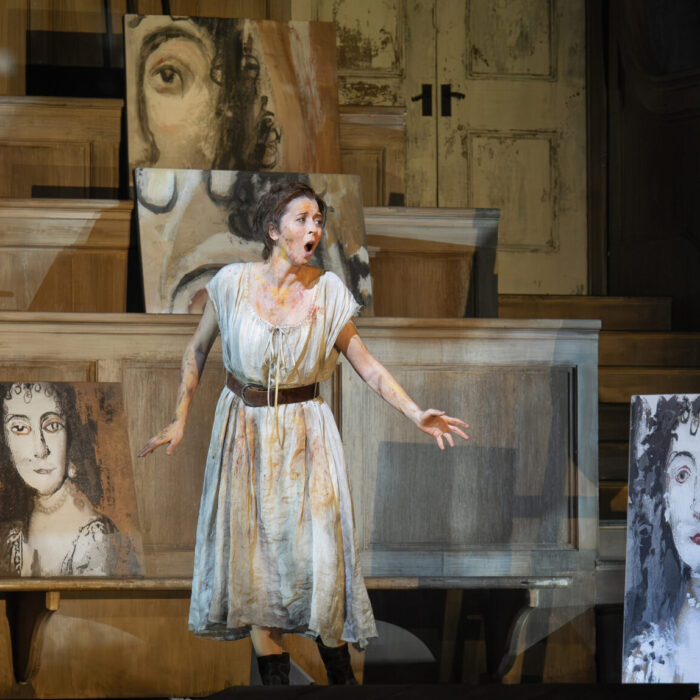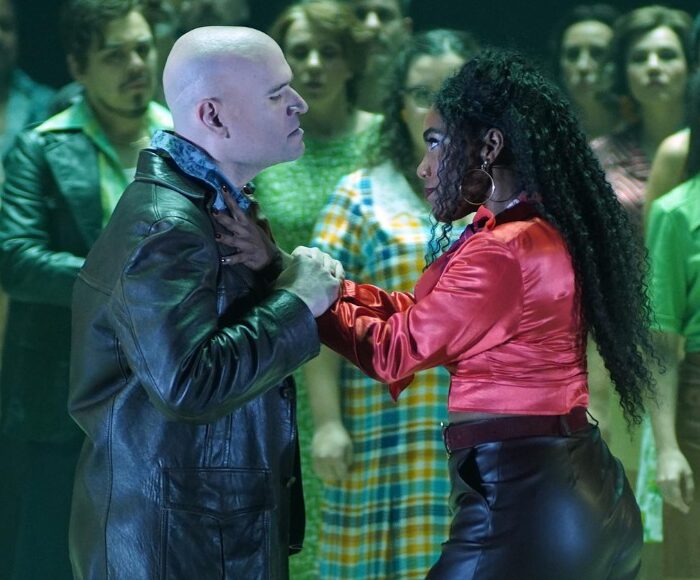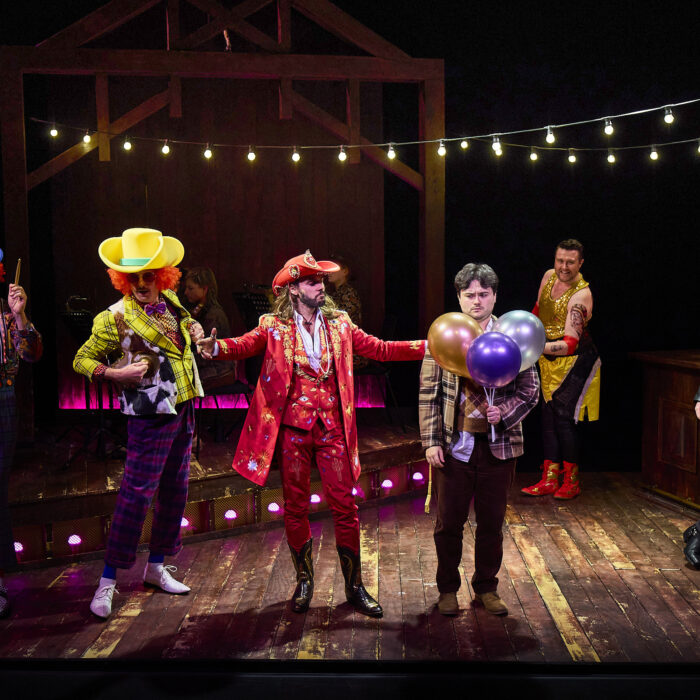
Opéra National de Paris 2024 Review: Don Quichotte
By João Marcos Copertino(Photo credit: Emilie Brouchon / Opéra national de Paris)
I’ve been told that one reads “Don Quichotte” three times in life: in one’s twenties to laugh, in one’s forties to think, and in one’s sixties to cry. This saddening saying reflects the multivocal quality of the Chevalier of La Mancha’s myth: painfully delusional and carnally human, his hallucinatory deeds are metaphors that represent us all. Jules Massenet’s “Don Quichotte” is less Cervantes’s than Jacques Le Lorrain’s—more romantic, and less comic. Nevertheless, there is still much space for comedy. Stage director Damiano Michieletto, however, embraced the fragility of the hero’s saga in a staging that materializes the life of a mentally challenged soul and the struggles of masculinity. It is a very, very sad opera after all.
Now all the setting happens in a plastic representation of a 1950s apartment. Quichotte, perhaps a prep-school teacher, works on his poetry while taking psychiatric medications that either constrain his hallucinations or on the contrary produce them. Sancho—here, more a partner-in-life than a servant—runs the house while witnessing his beloved losing his mind. Never has the famous couple been queerer than in this production; on the other hand, their friendship seems so intimate, and Sancho’s devotion so honest, that is hard to tell the nature of their love. One confronts an ambiguity familiar from Victorian documents and texts: heartfelt professions of devotion that, to ears attuned to language after gay liberation, seem indubitably sexual, while it nevertheless remains possible that they were as chaste as they often seem to profess to be.
Dulcinée, here, is a figure of Quichotte’s hallucinations: a beloved girl from his school days who rejected him. He has a photo of her in his dresser, making the whole Sancho-Quichotte coupling even more odd: how long has Sancho endured seeing the photo of this schoolgirl in his own home?
Dulcinée’s ghost is accompanied by a series of dark specters that evoke Spanish symbols—from gitanas outfits to Toreadors. All this nostalgic affection seems to embrace a mode of action and masculinity alien to Quichotte’s intellectual skills: he reads, he writes, and he seems very far removed from the kind of man from the past thus evoked. His hallucinations reflect his poetry: they aim for something beautiful that he cannot truly be.
The plastically morphic room stands in for Quichotte’s own mind, which often revolves like a carrousel, going nowhere, or in a circle. A trick that Michieletto has used before, it marks external represented events as manifestations of the inner workings of a psyche. In the near-sameness of the spaces, and the revolving stage that has figures on the stage in near-constant motion in order to go nowhere, one contemplates a figure for rumination, if not perhaps for obsession or madness. The result might be interesting to some, but to me, it is always dramaturgically confused and intellectually underwhelming.
In the age of regietheater, some directors have highly recognizable visual identities that traverse all their works: Lydia Steier fascination for decadence and violence; Calixto Bieito is the king of symbolism; Robert Carsen blends panache and sublimity; and so on. Michieletto seems to think himself an explorer of mental interiority and the labyrinthine of a human mind. While the approach may have been successful in other productions, here it truly sacrifices the dramatical action and cohesion in the name of simplistic readings. Let’s be honest, there is not that much action in Massenet’s “Quichotte” when it is all in the protagonist’s mind. Moreover, there were many dramaturgical incoherencies that made the opera hard to watch: if it is all in Quichotte’s mind, why is Sancho able to interact with the hallucinated figures? And, how revealing can such approach really be about the work of the human psyche? One perceives little about Don Quixote or about the opera that one hadn’t known before the production began: the payoff hardly seems worth the dramaturgical incoherence that it courts. Nevertheless, it is not wrong in its identifying of the basic problem of quichotism: the catastrophe and suffering that follows when the superego commands the mind. Michieletto is more sympathetic to his figures than is Flaubert in “Madame Bovary,” or Tennessee Williams, in “Streetcar Named Desire”—perhaps because his protagonist is a manly male—, but, even with that sympathy, the production left unexplored much of what is most interesting in the novel and the opera.
In Christian van Horn, Michieletto found the perfect charming and mentally doomed Quichotte. His voice, grave, but not gigantic, was uniform and expressive; his stage presence, full of charm, emphasized the mental struggles of the character in a manner that audiences no doubt found it easy to relate to. Nevertheless, all the comic effects were stripped away. In such a dramatic and serious approach, van Horn was also keen to provide a beautiful legato in some phrases—even though the effort cost him some of the intonation in the higher notes at the end of the phrases. His “Quand apparaissent les étoiles,” gently sung with carrousel horses in the background, was when he settled the mode of his lyrical character. His castmates may have covered over his fourth act duo with Dulcinée (“Oui je souffre votre tristesse”); anyone paying attention to him, however, would arguably have found the most moving moment of the opera—and I will explain why. If all the action is, indeed, all in Quichotte’s psyche, Dulcinée’s refusal to be with him is a manifestation of his own unconscious: even in his imagination, he does not dare to believe that he and Dulcinée can be together. Van Horn phrased the music with a dry voice, almost in a parlando. It did cost him a bit in his vocal projection (especially against Arquez’s voice), but it brought a dissonance between him and all his hallucinations with much poetical beauty. A true portrait of a tormented hero.
On the other end of the spectrum, Gaëlle Arquez sings a Dulcinée that is a well of sensuality and graciousness. In contrast to the novel’s protagonist, the opera paints Quichotte’s dame in more sympathetic than in Cervantes’s. Arquez is, in my opinion, the mezzo-soprano in Paris who perhaps best embodies the ideal form of the femme fatale. Although her scenic movements are sometimes too self-aware and controlled, her lentitude in moving on the stage also enables her to “save face” as a character. Her voice, most importantly, transmits this ideal character on a level unique to her. With a full rounded core, very compelling lower notes, and an explosive higher register, she makes it almost impossible to think what she cannot sing—especially with such a recognizable instrument. In Dulcinée, she had the opportunity to showcase all her vocal talents: in “Quand la femme a vingt ans,” we hear both her Dalila-like sensuality in long coloratura lines that made me jump out of my seat. And this was all in Act one…
Comradery, thy name is Étienne Dupuis. The Canadian Baritone embodied the most caregiving of all characters. In a queer-baiting couple, Sancho is extremely attentive to Quichotte and seeks to understand the struggles of his partner. Musically, Dupuis’ great phrasing and acting abilities were especially apparent in the fourth act. Having heard Dupuis singing more than a few times—a privilege of those who live in Paris—, I fear repeating myself describing the specificities of his instrument. A solid baritone voice, with good emission, Dupuis perhaps distinguishes himself less for the timbre of his voice than for his flexibility as an actor and his attentiveness to the text. Usually cast as the “bad guy,” Dupuis thrives when he is meant to be nurturing. His words have a received enunciation and his voice entered in full anger mode solely when he was trying to defend Quichotte from his own ghosts. This performance was a nice introduction to the tender side of Dupuis.
Under the direction of Patrick Fournillier, Paris Opera’s orchestra sounded a bit less competent than usual. The strings, particularly, showed some difficulty playing together and in tune. There were beautiful solos, nevertheless. Some moments, however, felt disconnected; the guitar, for instance, sounded too aloof from the singing and from the rest of the orchestra. Still, it was a solid performance.
The fate of Massenet’s “Don Quichotte” in America has not been the best; as far as I know, it has not been performed in New York for almost a century. There might be reasons for that. Although the opera is particularly striking, it is a bit prolix, and the Don Quijote myth might be too distorted from its original form for many tastes. Paris Opera’s new staging aims to emend that fate, but making all events the expression of Quichotte’s mind deprives the opera of its humor, even as it enables the audience to see the struggles of a tormented mind. The staging, full of good intentions, is too confusing for its own sake, but—with the aid of a good cast—it does not fail to bring a message to one’s attention: the danger of living only according to the guidance of our aspirations. Impoverishing to the world thereby reduced to hallucinations that are but the terrible manifestations of our own ego, it proves impoverishing to that all-powerful ego itself; haunted by desires without external impediments, we are thereby prevented from truly accepting something inside ourselves.


